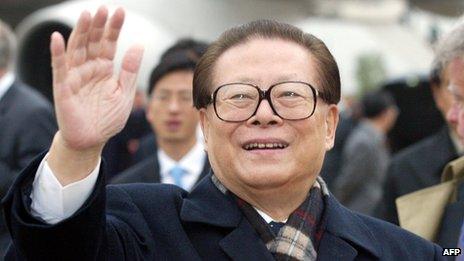Profile: Jiang Zemin
- Published

Jiang Zemin became president in 1989 after he was handpicked by Deng Xiaoping
A year and a half ago, public appearances by China's former president Jiang Zemin were so rare that speculation swirled of his health, and a Hong Kong television station was fined for reporting his death.
But in recent weeks, the 86-year-old has been very much in evidence, attending various events ahead of next month's pivotal party congress.
His re-emergence, say observers, is a signal to the Chinese public that he is in good health and intends to have a key say in the make-up of the once-in-a-decade leadership succession.
For even though he has not held an official post since 2004, he remains influential in Chinese politics - with allies in the highest echelons of the Party.
Social stability
Jiang Zemin was at the forefront of Chinese politics for 15 years.
As president from 1989 to 2003, he took the helm of the world's largest country in the wake of the Tiananmen Square killings.
When he came to power, China was a virtual pariah state. By the time he had handed the presidency over to Hu Jintao, it had become the fastest-growing economy in the world.
Hu Jintao (L) succeeded Mr Jiang as president
Mr Jiang's rise to power stemmed from a politburo purge of liberal leaders in 1989, after the ruthless suppression of the pro-democracy demonstrations in Tiananmen Square.
Paramount leader Deng Xiaoping, who held all the real power, needed to find a new protege to lead the Communist Party.
Mr Jiang, who as Shanghai party chief had weathered the student protests without resorting to violence, fitted the bill.
By the time Deng finally died in February 1997, Jiang Zemin had been given enough time to establish himself.
Not regarded as an innovative statesman, Mr Jiang is a facilitator whose main priority in power was to maintain social stability, continuing with gradual economic reforms and thus ensuring the Communist Party remained in power.
But he also attempted to make his mark as a political thinker, alongside Mao and Deng, by expounding the three representations theory - an attempt to modernise the Party.
The theory says the Party should further the development of "advanced social productive forces" [allow entrepreneurs and professionals membership of the party], develop culture, and represent the majority of the people.
'The Flowerpot'
Jiang Zemin was born to an intellectual family and graduated as an electrical engineer. He had previously worked in a Soviet car factory and as a diplomat in Romania in the 1950s.
Mr Jiang assumed office after the Tiananmen Square killings
He served as minister in charge of the electronics industry and as mayor and party chief in Shanghai.
He likes to recite poetry and plays the piano as well as an erhu, a two-stringed instrument similar to the violin.
Famously, he also delivered a stirring rendition of the Elvis Presley song Love Me Tender, after a dinner with Philippine President Fidel Ramos at the 1996 Asia-Pacific Economic Co-operation summit in Manila.
Former US ambassador to Beijing James Lilley recalls that Jiang was known as the "Flowerpot" by the people of Shanghai: ''Lots of decoration, no action."
"Well, it turns out he is a good consensus builder, he's a good manipulator," Mr Lilley said.
He has been credited with squeezing as much advantage as possible from events - such as the spy plane crisis or the Nato bombing of the Chinese embassy in Belgrade - but always allowing US ties to recover.
This was especially illustrated in the co-operation offered by China for Washington's "war on terror" following the 11 September attacks in 2001.
Jiang's shadow
Mr Jiang began the leadership transition to Mr Hu in November 2002, when he gave the younger man the post of party chief.
Mr Hu succeeded him as president in March 2003.
But until September 2004, Mr Jiang remained chairman of the commission which oversees China's armed forces, and retained a huge influence over foreign policy and security issues.
His supporters will work hard to protect his legacy and his family interests.
His son, Jiang Mianheng, has been called the "Prince of Information Technology".
The US-educated entrepreneur is chairman of the state-run China Netcom and is also in partnership with Taiwanese tycoon Winston Wong to build a $1.6bn semiconductor plant in Shanghai.